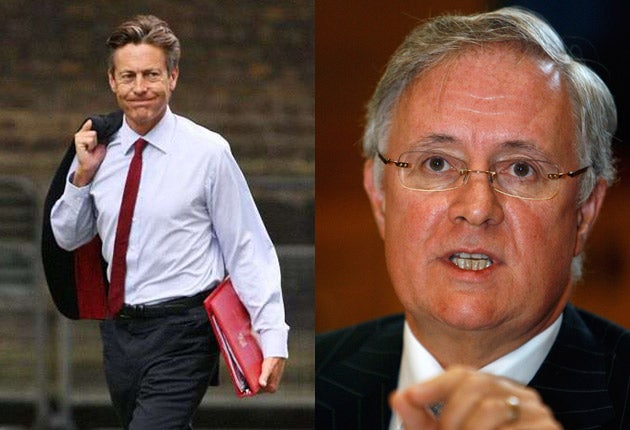Culture Secretary calls for BBC Trust to be dismantled
Row intensifies over possible sharing of licence fee with commercial bodies

Your support helps us to tell the story
From reproductive rights to climate change to Big Tech, The Independent is on the ground when the story is developing. Whether it's investigating the financials of Elon Musk's pro-Trump PAC or producing our latest documentary, 'The A Word', which shines a light on the American women fighting for reproductive rights, we know how important it is to parse out the facts from the messaging.
At such a critical moment in US history, we need reporters on the ground. Your donation allows us to keep sending journalists to speak to both sides of the story.
The Independent is trusted by Americans across the entire political spectrum. And unlike many other quality news outlets, we choose not to lock Americans out of our reporting and analysis with paywalls. We believe quality journalism should be available to everyone, paid for by those who can afford it.
Your support makes all the difference.The Culture Secretary, Ben Bradshaw, called for an overhaul of the regulatory structure of the BBC yesterday and claimed that the Corporation's governing body, The BBC Trust, should be scrapped.
In a speech to the Royal Television Society's annual convention in Cambridge, Mr Bradshaw said the Trust, which only came into effect in 2007 after the Hutton inquiry into the death of David Kelly, was "an unsustainable model" and should be replaced.
"Although the Trust has performed better than its predecessor, I don't think it is a sustainable model in the long term," said Mr Bradshaw, who formerly worked for the Corporation as a journalist. "I know of no other area of public life where – as is the case with the Trust – the same body is both regulator and cheerleader."
The BBC is under intense pressure from commercial media organisations that complain it has grown too large. The Corporation's senior management is concerned that a future Conservative government would try to reduce the BBC licence fee.
The BBC Trust dramatically entered that debate last week when its chairman, Sir Michael Lyons, penned an "open letter" to licence fee payers saying that opinion polls suggested the public was opposed to the BBC licence fee being shared with commercial organisations.
The Department of Culture, Media and Sport has since published a different survey showing that two-thirds of respondents would support the fee being shared.
With the Department and the BBC Trust seemingly at war, Sir Michael responded by saying that the prospect of "upsetting a minister" would not stop him doing his job. "The next Charter Review is many years down the line and we should be judged on our performance then. In the meantime, we have been set up to be, as the then Secretary of State put it in 2006, 'the voice, eyes and ears of licence fee payers'. That means reshaping the BBC; defending its strength and independence; and protecting the investment licence-fee payers have made. If that means upsetting a minister along the way, it is unfortunate but so be it."
During his Cambridge speech, Mr Bradshaw criticised the way Sir Michael had entered the debate and suggested that licence-fee payers might be offered a £5.50 rebate rather than allow outstanding funds from the licence fee to be spent by commercial media. "Is this really about the long-term interests of public service content? I would just like to point out that the £5.50 is not the BBC's to give away," said Mr Bradshaw. "This is not a serious or sensible way to have a debate about something as important as the future of the BBC and public service broadcasting."
The Culture Secretary said that the BBC had grown big enough, saying "I happen to think the BBC probably has reached the limits of reasonable expansion". Following claims that the BBC is overly secretive over its finances, especially on matters such as the salaries paid to star presenters, he called for the National Audit Office to be given access to the Corporation's accounts.
The Conservatives' culture spokesman Jeremy Hunt claimed that Mr Bradshaw was trying to steal the Conservatives' policies. He also criticised the Government for proposing the break-up of a body which it had itself established so recently. "People will ask if there is any consistency in media policy when the Culture Secretary has proposed abolishing a body set up by his own government less than three years ago," he said.
Join our commenting forum
Join thought-provoking conversations, follow other Independent readers and see their replies
Comments